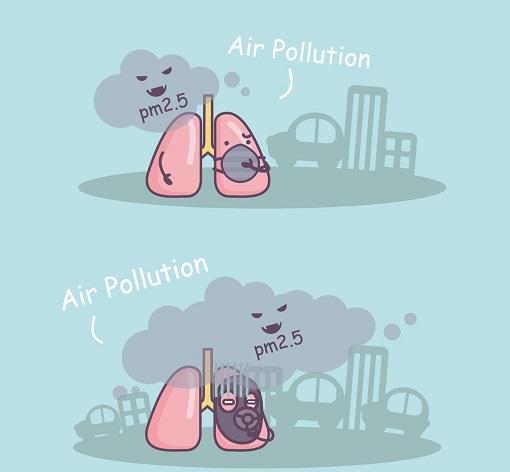PM2.5 refers to particulate matter in the atmosphere with an aerodynamic equivalent diameter less than or equal to 2.5 microns, also known as lung-accessible particulate matter (no standard Chinese name available). Although PM2.5 is only a small component of the earth's atmosphere, it has an important impact on air quality and visibility, etc. PM2.5 has a small particle size, is rich in a large number of toxic and harmful substances and has a long residence time and long transport distance in the atmosphere, so it has a greater impact on human health and atmospheric environment quality.
2.Impact of PM2.5 on climate and human body
There is a lot of epidemiological evidence that PM2.5 has acute and chronic health effects. The acute health effects are reflected in the increased risk of acute respiratory and cardiovascular diseases from high PM2.5 exposure, while the chronic toxicity is reflected in the possible induction of chronic diseases such as lung cancer, COPD (chronic obstructive pulmonary disease), and cardiovascular diseases from PM2.5. It has also been shown that exposure to fine particulate matter can affect the human immune system, nervous system, etc.
People generally think that PM2.5 is just air pollution. In fact, the impact of PM2.5 on the overall climate may be even worse. PM2.5 can influence cloud formation and rainfall processes, indirectly affecting climate change. The condensation nuclei of rainwater in the atmosphere, in addition to salt in seawater, and fine particulate matter PM2.5 are also important sources.
Under some conditions, PM2.5 is too much and may "eat" the water, so that the cloud drops in the sky do not grow much, and the blue sky and white clouds become less than before; under some conditions, PM2.5 will increase the number of condensation nuclei, so that the number of raindrops in the sky increases, and in extreme cases, heavy rain may occur.
3.Life response
It is not advocated to open windows in the morning and evening to ventilate in hazy weather, and it is better to wait for the moon to come out before opening windows to ventilate. Hazy weather is a "dangerous day" for patients with cardiovascular disease, especially the elderly with respiratory and cardiovascular diseases, foggy days are best not to go out, more should not be morning exercise, otherwise it can induce disease, and even heart attack, causing life-threatening.
Experts pointed out that the reason why foggy days are "dangerous days" for patients with cardiovascular disease is because of the high air pressure when foggy, the oxygen content in the air is elevated, people can easily feel chest tightness, the morning damp and cold fog will also cause cold stimulation, which can easily lead to esophageal spasm, blood pressure fluctuations, increased heart load, etc.
At the same time, some pathogens in the fog can cause headaches and even induce hypertension, cerebral hemorrhage and other diseases. Therefore, people with cardiovascular disease, especially the elderly and infirm, should not go out in foggy days, not to mention the morning exercise in foggy days to avoid danger.

